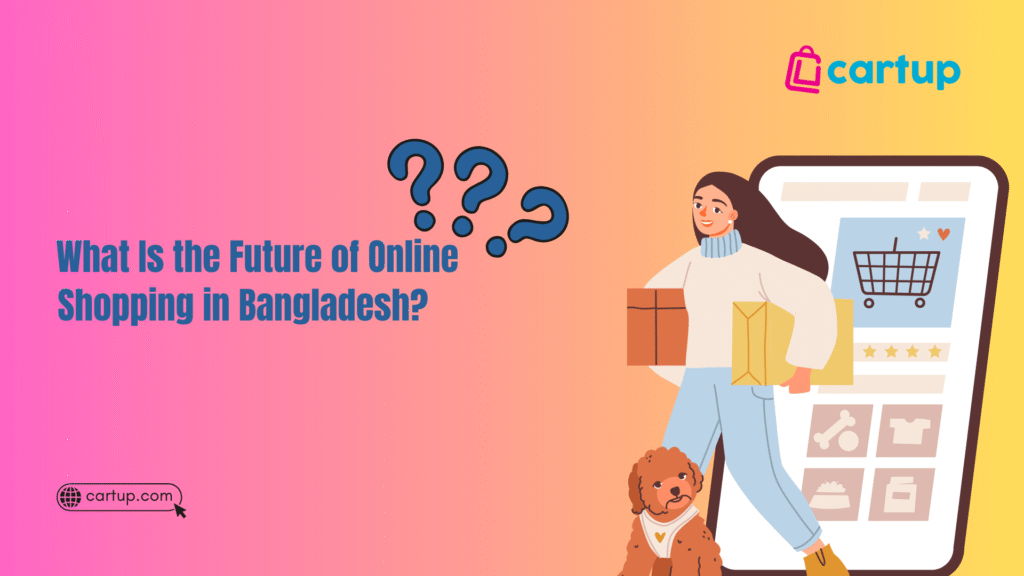
What’s your experience of online shopping in Bangladesh? Is it good, bad or just average? Though everyone may have a different experience when it comes to shopping online, the future of online shopping in Bangladesh looks bright. E-commerce platforms have gradually become an essential part of daily life, and with several key factors in play, the country’s online market is poised for significant growth in the coming years.
To better understand where we’re heading, let’s explore the current trends, opportunities, advantages, and challenges shaping the industry.
Takeways
- The e-commerce market is projected to reach $25.2 billion by 2028 with 23.2% annual growth.
- E-commerce platforms are shifting towards a wider variety of products, more efficient future online payment solutions, and faster delivery.
- There are a few key trends that are shaping the future: mobile commerce, rural expansion, AI, digital payment, and logistics infrastructure.
- There are popular online shopping sites, including Daraz, Chaldal, Cartup, Pickaboo, and Rokomari.
Is Online Shopping Growing in Bangladesh?
Online shopping in Bangladesh has been steadily growing since the early 2000s, but it truly accelerated during the COVID-19 pandemic in 2020 when consumers turned to digital platforms for daily needs. According to ScienceDirect, the country experienced a notable rise in online purchases during that period.
Reports from Dhaka Tribune and eCommercedb project the e-commerce market to grow at a compound annual growth rate of 23.2%, reaching $25,240.9 million by 2028. This growth is fueled by young consumers, festive sales, and improved logistics, making online shopping an integral part of daily life.
With the rise of mobile penetration and internet access, platforms like Daraz, Chaldal, Cartup, Pickaboo, and Rokomari have become increasingly popular due to their user-friendly apps, sales offers, and fast delivery.
Importantly, these platforms are no longer limited to urban areas—rural regions are also gaining access to essential products online, further expanding the reach and trust in Bangladesh’s e-commerce sector.
| Online store | Category strength | Why renowned |
| Daraz | All categories are pretty much popular | – Biggest online marketplace – Mega deals & offers |
| Pickaboo | – Gadgets – Electronics | – Trusted quality – Warranty-backed products |
| cartup | – Fashion – Electronics – Fashion items | – Affordable price rate – Authentic product – Reliable delivery |
| Chaldal | – Groceries – Daily essentials | – Fast delivery |
| Rokomari | – Books | – Extensive book selection |
Online Shopping Challenges in Bangladesh – Then vs Now
| Factors | Before | Now |
| Product variety | Very limited items | Wide range of products |
| Payment methods | Mostly Cash on Delivery (COD) | – Digital wallets (bKash, Nagad) – Cards – EMI – COD |
| Customer trust | Low: – Fear of fraud – Poor product quality | Improved with: – Reviews – Return policies – Verified sellers & etc |
| Delivery speed | Slow (5–10 days average) | Faster including: – Same day – Next day delivery |
| Market players | Few online stores, but mostly local startups | Multiple top-rated online platforms: – Daraz – Pickaboo – Chaldal – Othoba & etc |
| Accessibility | Urban-focused only | Nationwide reach |
| Consumer awareness | Limited knowledge of the online store in BD | – Tech-savvy buyers – High adoption in the digital world |
| Discounts & promotions | Seasonal or rare offers | Frequent mega sales offers |
Trends Shaping the Future of Online Shopping in Bangladesh
Notably, the future of Bangladesh’s online market is shaped by several trends, which are-
1. Rise of mobile commerce
A large portion of the population currently uses smartphones. The best shopping apps are currently dominating the market. In the future, they will be more focused on making shopping faster and more personalized.
2. Expansion into rural areas
Lack of proper logistics, most online stores in BD focus on serving urban areas, but with better logistics, rural consumers will become a major growth driver.
3. Integration of AI & Chatbots
In the next few years, growth in the online marketplace will be driven by personalised recommendations and AI, which will eventually make online shopping even more engaging.
4. Digital Payments
Although the majority of transactions occur through cash on delivery, digital wallets such as bKash, Nagad & Upay are slowly but surely becoming mainstream in online payments.
5. Faster Deliveries
Fastest delivery throughout the nation, while same-day & next-day delivery will become common in BD online shops.
Social Commerce in Bangladesh
In today’s business market, social media has become a powerful tool for every business, and that’s how social commerce is emerging as a key factor in Bangladesh’s e-commerce growth. Key factors include:
- Platforms like Facebook, Instagram, and TikTok are increasingly used to buy and sell products directly.
- Small businesses and local sellers are leveraging social media to reach customers without traditional e-commerce infrastructure.
- Influencer marketing and live shopping events are the next big thing in terms of sales and engagement.
- Social commerce offers convenience, trust through peer reviews, and affordable marketing for sellers.
Advantages & Pros of Online Shopping
Though there are many reasons why customers prefer to shop online rather than visiting physical stores, here are some major advantages:-
1. Convenience
Customers can shop anytime, anywhere, and it’s time-saving.
2. Price comparison
Compare prices across all e-commerce sites in BD
3. Variety
In online stores, there’s access to thousands of products that are not always available offline.
4. Discounts & offers
There are frequent online sale events that offer multiple deals and discounts; these types of offers eventually attract a large number of customers.
5. Reviews & Ratings
Customers can check online marketplaces’ reviews & ratings before buying any products.
Challenges of Online Shopping
While online shopping is expanding a lot, it is not without challenges. There are still barriers; understanding the pros and cons of it is key. The challenges are-
1. Product mismatches and quality issues: Shoppers should be aware of the cheapest website for online shopping. Still, there are a few platforms that still struggle with product mismatches and quality issues.
2. Limited rural coverage: Due to delivery networks and proper logistics, e-commerce platforms couldn’t reach their full potential outside urban regions.
3. Return & refund issues: Returns and refunds are kind of time-consuming and complicated. Often, policies are unclear, and ultimately, this leads to frustration among customers.
4. Cybersecurity risks: There’s a previous record that online shoppers are sometimes exposed to data breaches or scams, which is a big concern in the e-commerce sector.
5. Limited trial experience before buying: In physical stores, there’s an option for product trial, but online customers cannot try or test products before buying. This lack of hands-on experience leads people to skip online purchasing.
Lastly, the future of e-commerce in Bangladesh looks promising, fueled by digital transformation, technology, young consumers and good online shopping apps. The logistics and delivery future in BD will play a key role, making online shopping faster and more reliable. At the same time, social commerce is set to expand further, bringing more convenience, affordability, and innovation to shoppers.
FAQ
1. Which industry will grow in the future in Bangladesh?
According to BIDA, industries like e-commerce, IT, pharmaceuticals, fintech, and digital services are expected to grow fastest.
2. What is the next big thing in e-commerce?
The rise of online shopping through mobile, social commerce, and AI-driven personalization will shape the next wave of e-commerce.
3. Is online shopping growing rapidly in Bangladesh?
Yes, according to Statista, online shopping is expanding quickly. Wider internet access, smartphone use, and adequate logistics are key factors.
4. Will rural areas benefit from e-commerce growth?
Yes, improved delivery networks and internet access are bringing e-commerce to rural shoppers.
5. Will digital payments overtake Cash on Delivery soon?
Digital payments are growing fast, but Cash On Delivery (COD) will remain popular until trust and infrastructure fully mature.
6. Which online shopping platforms are leading in Bangladesh?
Daraz, Chaldal, Cartup, Pickaboo, and Rokomari are among the top platforms.























